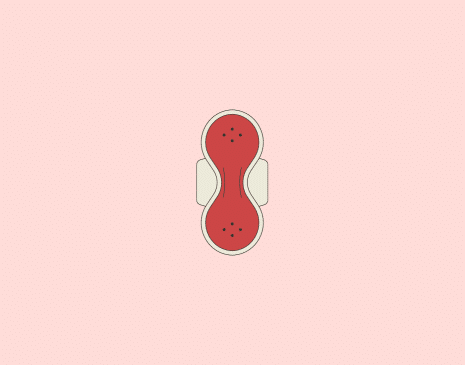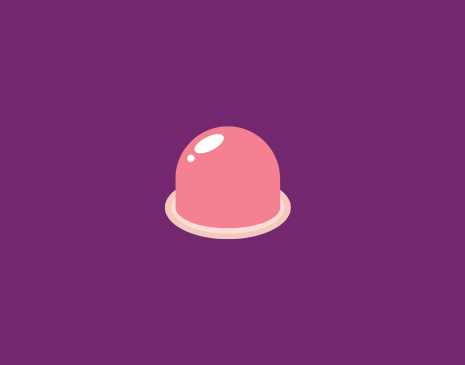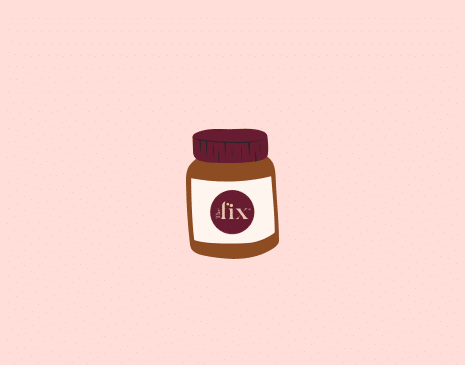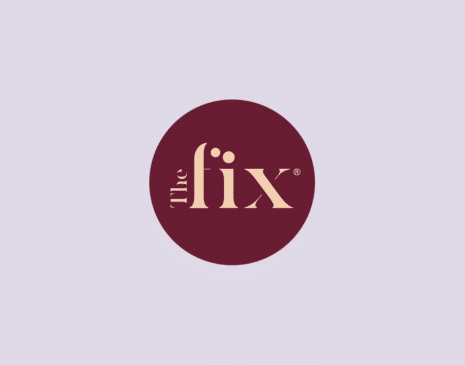Welcome to our guide on how to make your period lighter, where we delve into simple and effective strategies to help you easily navigate that time of the month. If you’re tired of dealing with heavy flows and searching for practical solutions, you’re in the right place. Our user-friendly tips are designed to empower you with the knowledge to lighten your period naturally. Say goodbye to the hassle, and let’s explore practical steps to make your menstrual cycle more manageable. Let’s dive in!
What Makes Your Period Heavy?
Several factors can contribute to a heavy menstrual flow. Understanding these factors can help you identify potential causes and explore ways to manage or reduce the heaviness of your period. Here are some common reasons:
Hormonal Imbalances
Fluctuations in hormones, particularly oestrogen and progesterone, can affect the thickness of the uterine lining. An imbalance may lead to a heavier flow.
Uterine Fibroids
Non-cancerous growths in the uterus, known as fibroids, can cause heavy menstrual bleeding. These growths vary in size and are influenced by hormonal changes.
Adenomyosis
This condition happens when the tissue that lines the uterus begins to grow into the muscular walls of the uterus. It can result in a thick uterine lining and heavier periods.
Polycystic Ovary Syndrome (PCOS)
Women living with PCOS may experience hormonal imbalances that can lead to irregular periods and heavy bleeding. Learn how to spot the early signs of PCOS.
Pelvic Inflammatory Disease (PID)
Infections in the reproductive organs, such as PID, can cause inflammation and lead to heavy menstrual cycles.
Use of Blood Thinners
Certain medications, like blood thinners, can contribute to heavier menstrual bleeding.
Hormonal Intrauterine Device (IUD)
While some women experience lighter periods with an IUD, others may notice an increase in menstrual flow. What’s an IUD? It’s a small, T-shaped contraceptive device inserted into the uterus to prevent pregnancy.
Thyroid Disorders
Conditions such as hypothyroidism or hyperthyroidism can impact menstrual regularity and flow.
If you’re concerned about the heaviness of your period, it’s essential to consult a healthcare professional. They can help determine the underlying cause and recommend appropriate treatments or lifestyle changes to address your situation.
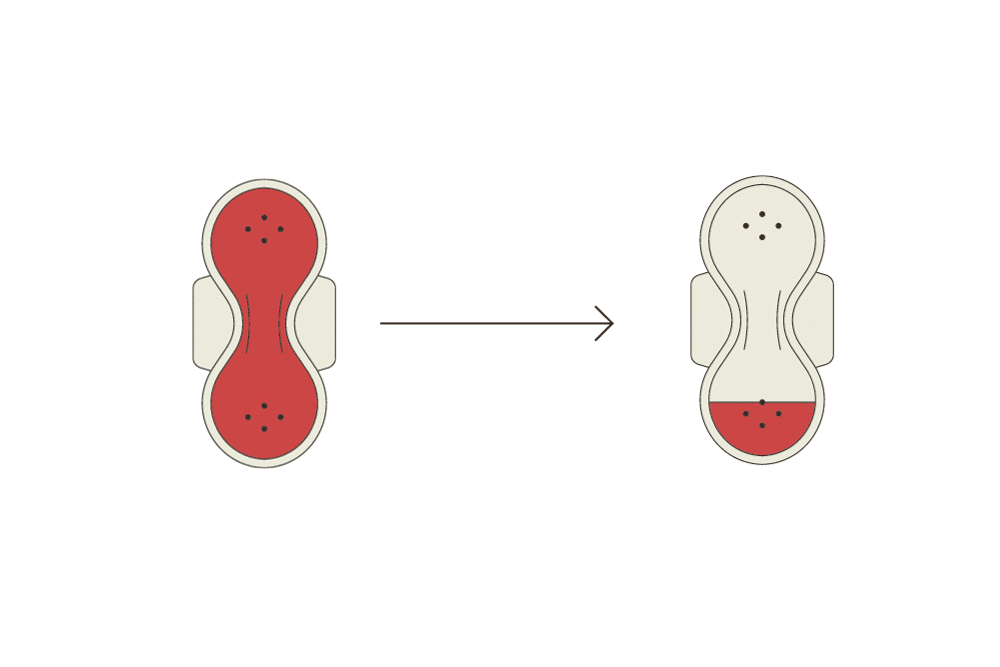
What Helps Lighten Period Blood?
While you cannot change the colour of your menstrual blood, you can adopt certain practices to promote overall menstrual health and potentially reduce the intensity of your period. Here are some tips that may help:
Stay Hydrated: Drinking adequate water helps maintain overall health and may contribute to more balanced bodily functions, including your menstrual cycle.
Balanced Meals: A diet rich in fruits, vegetables, and whole grains provides essential nutrients that support hormonal balance. Consider incorporating foods high in iron, such as leafy greens and lean proteins.
Regular Exercise: Physical activity can help regulate hormones and improve circulation, which may positively influence your menstrual flow.
Manage Stress: Chronic stress can impact your hormonal balance and menstrual cycle. Practice stress-reducing activities like meditation, mindfulness, yoga, or deep breathing exercises.
Maintain a Healthy Weight: Being underweight or overweight can affect your menstrual cycle. Aim for a balanced weight through a combination of a healthy diet and regular exercise. If you’re wondering how to lose weight with PCOS, consult your healthcare provider for ways that may help.
Consider Hormonal Birth Control Methods: Some hormonal contraceptives, such as birth control pills or hormonal IUDs, can regulate and lighten menstrual flow. Consult your healthcare provider to discuss the best birth control option for you.
Vitamin and Mineral Supplements: In consultation with your healthcare provider, consider supplements like iron or vitamin C, which may support overall menstrual health.
Herbal Remedies: Some herbs, like ginger or chamomile, are believed to have anti-inflammatory properties that could affect menstrual flow. However, more research is needed, and it’s essential to consult a healthcare professional before trying herbal remedies.
Remember, individual responses vary, and what works for one person may not work for another. It’s important to consult with your healthcare provider before making significant changes to your lifestyle or trying new supplements or remedies. They can provide personalised advice based on your specific health needs and circumstances.
What Foods Make Your Period Lighter?
While there isn’t conclusive scientific evidence that specific foods can directly lighten menstrual flow, maintaining a balanced and nutrient-rich diet can support overall reproductive health and hormonal balance. Here are some nutrients and foods that play a role in menstrual health:
Iron-rich foods: Consuming foods high in iron, such as spinach, lentils, and lean meats, is important because heavy periods can lead to iron deficiency (anaemia). Adequate iron levels support overall health.
Vitamin C-Rich Foods: Vitamin C enhances the absorption of iron. Include citrus fruits, strawberries, bell peppers, and broccoli in your diet.
Omega-3 Fatty Acids: Found in fatty fish like salmon, flaxseeds, and walnuts, omega-3 fatty acids have anti-inflammatory properties that may help with menstrual discomfort.
Calcium-Rich Foods: Calcium is essential for muscle function and may help alleviate menstrual cramps. Good sources include dairy products, fortified plant-based milk, and leafy green vegetables.
Zinc: Foods rich in zinc, such as pumpkin seeds, chickpeas, and cashews, can support immune function and hormone regulation.
B-Vitamins: B vitamins, including B6 and B12, are essential for overall health. Sources include whole grains, eggs, and dairy products.
Magnesium: Magnesium-rich foods like bananas, almonds, and spinach may help alleviate muscle cramps and discomfort during menstruation.
Hydration: Staying well-hydrated is crucial for overall health, and it may help manage bloating and fluid retention associated with menstruation.
It’s important to note that while a healthy diet can contribute to overall well-being and may indirectly affect menstrual health, individual responses vary. If you have concerns about the heaviness of your period or experience significant changes in your menstrual cycle, it’s advisable to consult with a healthcare professional.
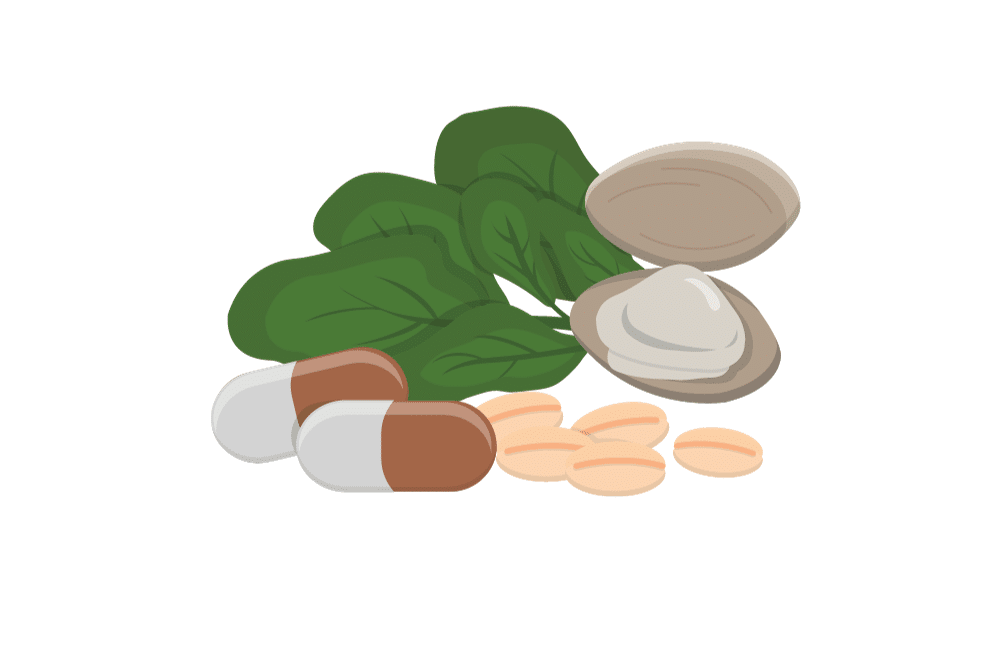
How Can I Lighten My Period Fast?
While there is no instant method to dramatically make your periods lighter, a few practices may help to manage menstrual flow (and fill your menstrual cup slower). Staying well-hydrated and maintaining a balanced diet rich in iron, vitamin C, and other essential nutrients can contribute to overall reproductive health. Additionally, incorporating regular exercise into your routine may help regulate hormones. Some individuals find relief through hormonal contraceptives like birth control pills, which can often result in lighter and more predictable periods.
How Can I Reduce My Heavy Period Naturally?
Reducing heavy periods naturally involves lifestyle changes and practices that support hormonal balance and overall reproductive health. Here are some strategies you can consider:
Maintain a Balanced Diet: Consume a diet rich in iron, vitamin C, and other essential nutrients. Include leafy greens, lean proteins, whole grains, and fruits to support overall health.
Stay Hydrated: Drinking enough water is crucial for overall well-being and may help manage bloating and fluid retention associated with menstruation.
Regular Exercise: Engage in regular physical activity to promote hormonal balance and improve circulation. Activities such as walking, swimming, or yoga can be beneficial.
Manage Stress: Chronic stress can impact hormonal balance. Practice stress-reduction techniques such as meditation, deep breathing, or mindfulness to promote overall well-being.
Herbal Remedies: Some herbs, like ginger, chamomile, or raspberry leaf, are believed to have potential benefits for menstrual health.
Magnesium Supplements: Some women find relief from menstrual cramps and discomfort by taking magnesium supplements.
Heat Therapy: Applying heat to the lower abdomen through a hot water bottle or warm bath may help relax muscles and alleviate menstrual cramps.
Adequate Sleep: Ensure you get enough restorative sleep, as sleep plays a crucial role in hormonal regulation and overall well-being. Consider sleep treatments online, like melatonin, if you find it hard to get a good night’s rest.
Limit Caffeine and Alcohol: Excessive caffeine and alcohol consumption can contribute to hormonal imbalances. Moderation is key, and reducing intake may positively impact menstrual health.
Hormonal Birth Control Options: Hormonal contraceptives, such as birth control pills or hormonal IUDs, can regulate and lighten menstrual flow. Consult with your healthcare provider to discuss the best option for you.

How Can I Shorten My Period Naturally?
While it’s not possible to significantly shorten the duration of your menstrual cycle, the natural practices mentioned above may help manage the associated symptoms and make your period more manageable. While these approaches may not necessarily shorten the length of your period, they can contribute to a healthier and more comfortable menstrual experience. Consult a healthcare professional for personalised guidance and advice if you have specific concerns or if your menstrual cycle is consistently irregular or problematic.

